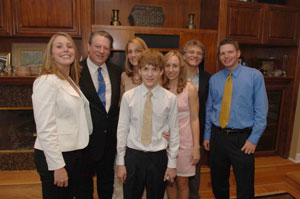A Lafayette Board Associate, Mitchell Berger ’77 is chairman and founder of the Florida law firm Berger Singerman. He was a member of President Clinton’s transition team and was senior adviser to the Gore 2000 Campaign. He served on the board of the Student Loan Marketing Association from 1994-2001 and was appointed as chairman in 1998 by President Clinton. He has served on many other boards and commissions, including the EPA’s Environmental Financial Advisory Board, the Florida Environmental Commission, and the United States Small Business Agency Advisory Board.
Berger has received numerous awards, including being named Co-Lawyer of the Year by the National Law Journal. He was distinguished lecturer at Nova Southeastern School of Business and Entrepreneurship and guest lecturer at Vanderbilt University’s Presidential Leadership class. His clients have included AOL Time Warner, Waste Management, and Econolodges of America. He received his law degree from Temple University Law School.
Graduating in 1977, I did not know that so many of my interests and things I care about would begin to take shape and mature on College Hill.
Hope, my wife of 27 years, and I began dating while I was a student at Lafayette. In those days, there were wonderful, inspiring walks along the quadrangle. Sitting by the big tree at Hogg Hall, dreams began to take shape, encouraged in the incubator provided by this small liberal arts college on the hill. I have always wanted to pursue interests in business, economics, law, and politics. Lafayette gave me a foundation so that I could combine all of these interests in my career. As I pursued a major in business and economics, the College’s flexible curriculum allowed me to dabble in government, law, religion, and geology — including the study of human impacts on the health of rivers in Tennessee. I learned that I could nurture my quest for knowledge and apply that knowledge in a wide range of academic and practical pursuits. Indeed, the most practical knowledge I gained was from the numerous religion courses I took with Professor Stephen Lammers — that one must have a strong ethical and moral foundation to pursue anything worthwhile.
While at Lafayette, national politics infected me or me it. I became a campaign operative for Jimmy Carter in Pennsylvania in 1975, a campaign which ended up with Carter winning the state primary on April 27, 1976 and using that victory to catapult him to the Democratic nomination in the summer and the Presidency in the fall. Professors Pfretzschner and Pierce encouraged my interest in the Carter campaign. Their advanced seminar in public policy for economics and government & law majors taught me to see how the aspirational in public policy must be grounded in the practical of economic conditions and market constraints. In Professor Pfretzschner’s case, he gave additional practical guidance to this young novice backroom politician on how to maneuver past the old line Pennsylvania Democratic machine, which was not backing Carter, to achieve delegates pledged to him and an eventual Carter victory. My in-class education was supplemented by practical mentoring and guidance.
All of these were valuable experiences that I could build upon as my career in law, business, economics, and politics revealed itself. Being involved in several Presidential campaigns, that first experience with Jimmy Carter and Professor Pfretzschner was foundational. In my involvement as President Clinton’s chairman of the board of Sallie Mae, restructuring the student loan business in the United States, the instruction in economics and the practical needs of the rules of markets to be merged with aspirational public policy served me well. The same was true in working with Vice President Gore and Governor Lawton Chiles in reversing the effects of pollution and development on Florida’s Everglades. The business principles taught to me by Lafayette have helped me to start a law practice in Florida which has grown to employ 55 lawyers and 72 support personnel.
But most of all, I remember exploring ethics and morality in the religion classes with Professor Lammers. While the utilitarian principles of Adam Smith and the egalitarianism principles of Karl Marx did not immediately translate into his classroom, I learned how these constructs could be traced to the ethical and moral beginnings of all societies, which govern both private and public conduct to this day. I know many times I have called on the lessons learned in these classes to govern my conduct in raising my family with my wife Hope (we have four children, including Amanda ’09), growing my law practice, and conducting public affairs.
Private sector experience, public service, and most importantly, family. All of these components of my life can be traced to foundational experiences at Lafayette College. At all times learning to make the tough choices which lead to the benefits and fulfillment of a life well lived. Doing the right thing in all circumstances is a foundational principle of life, encouraged, nourished, and grown to maturity in the classrooms at Lafayette. It is something I will always have with me, and I will always be grateful that Lafayette helped to instill it.
Written in first person, Connecting articles link the student experiences at Lafayette with life’s experiences after graduation. Submissions by alumni and suggestions for potential writers are welcomed.

Mitchell Berger ’77 and his family meet with former Vice President Al Gore.
